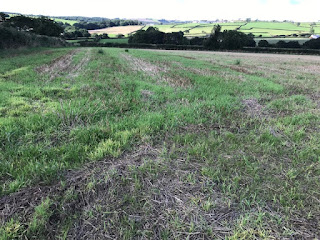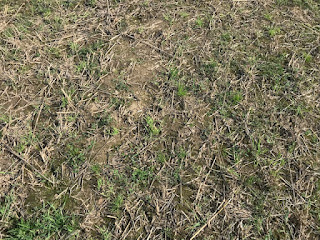I love the word Aftermath, with its apparent Anglo-Saxon simplicity.
I read that it means after the mowing, perhaps a second or later mowing; more specifically, it can refer to the crop of grass which springs up after the mowing earlier in the summer.
Even if the quality of the grass be criticised as not having the fragrance or sweetness of the first crop, or worse, dismissed as 'the bloomless aftermath', it is after all new growth – a reminder of what has been, and of what is yet to come.
Aftermath
Yes, the grass will grow again.
There will be another season
here upon these same old fields
where sheep shall safely graze again
as if it were the first occasion.
Fresh growth of flimsy blades will spring
to feed a new-born generation
here once more, in time, expected
along with others, all those others
drawn forth to prosper in the sun.
And some who left will come again
remembering this place.
A pair of swallows from the past
will score the sky above the grass
which will have grown to feed them all.
So in that season I shall come
and stand again on these old fields
amongst the new life springing up
to grow with the sun with all the rest
history interred beneath my feet.
Aftermath – a simple word?
The original meaning was somewhat complex, but now it's been extended to mean the later consequences of a particular incident or occurrence, especially if bad. Some dictionaries give this as the primary meaning.
So it's not a simple word at all.
For me, it speaks of time, especially of the continuity of time – past, present and future – not of bad later consequences, but of what can appear after the harvest is reaped, indeed of the inevitable necessity of clearing the ground so that new life can spring up.
I hope my poem celebrates the continuity and interconnectedness of all life.
And all flesh is as the grass, whether we happen to be sheep, humans, swallows or any other living creature. That grass may be mowed once, twice or countless times, but like the seasons and life itself, it will return.
And perhaps, after all, being interred is the best place for the past, even if it feels quite close.



Beautiful
ReplyDelete"A pair of swallows from the past
ReplyDeletewill score the sky above the grass"
Yes
I also love Aftemath in its old usage, and loved turning my sheep out to graze on it after the hay was safely in. Thanks for extending it to thoughts of time and succession.
ReplyDeleteLovely green grassy poem. Makes you want to walk in the fields, breathe the air. Thank you.
ReplyDeleteBest wishes Harbans.
ReplyDelete